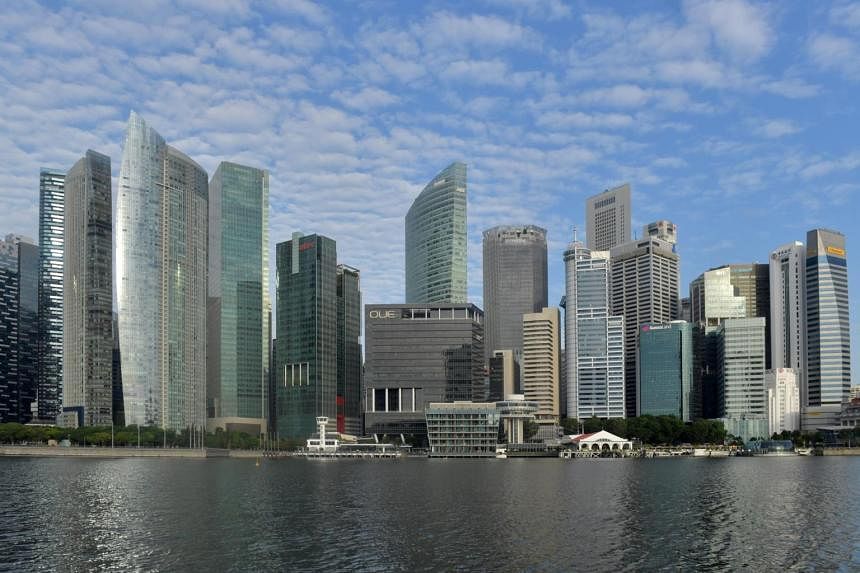SINGAPORE - Setting up a digital platform for small businesses, positioning the country as a regional hub for philanthropy, and turning stocks, bonds and real estate into digital tokens are some of the new initiatives in Singapore's updated financial sector transformation plan.
Led by the Monetary Authority of Singapore (MAS), the plan will ensure the financial sector grows by an average annual rate of 4 per cent to 5 per cent from 2021 to 2025 and create 3,000 to 4,000 net jobs on average each year.
The Financial Services Industry Transformation Map (ITM) 2025, which was unveiled by Deputy Prime Minister Lawrence Wong on Thursday, reinforces the goals set in ITM 2020.
It also lays out strategies to help the Republic's financial industry take a leap into the future, and train a workforce that can tap the opportunities that the future holds.
But the primary goal remains the same - to maintain Singapore's lead as an international financial centre that connects global markets, supports Asia's development and serves Singapore's economy.
The updated plan details five strategies to achieve that goal: enhance asset class strengths; digitalise financial infrastructure; catalyse Asia's net-zero transition; shape the future of financial networks; and foster a skilled and adaptable workforce.
Within these strategies are several initiatives focused on further cementing Singapore's status as a financial hub.
For example, while deepening capabilities in asset classes is an ongoing effort, aiming to become Asia's centre for philanthropy is a new idea.
Many companies dwell in philanthropic activities on their own. Singapore will now invite financial services firms to offer them structured solutions to monitor the impact of those activities, as well as innovative philanthropy models.
In addition, Singapore will encourage private capital markets to offer credit to businesses. This would broaden the horizon for companies that are now dependent on funding from private equity and venture capital firms.
Promising financial technology start-ups will be incentivised to develop capabilities in new online technologies like Web 3.0, artificial intelligence and green fintech.
To digitalise financial infrastructure, MAS will promote the development of digital platforms for the bond market and funds industry.
Meanwhile, a digital platform for small and medium-sized enterprises (SMEs) will help them discover trade opportunities overseas.
Dubbed as Business-sans-Borders, the platform will connect Singapore SMEs to growth regions and facilitate easier access to trade financing.
To catalyse net-zero transition across the region, MAS is already working with the industry to develop innovative solutions to scale up sustainable and transition financing. A $100 million grant will be provided from 2021 to 2025 to nudge companies towards capability building, green fintech, climate risk and reinsurance, and developing solutions for sustainable and transition finance.
The strategy aimed at shaping the future of financial networks includes initiatives such as supporting tokenisation of financial and real economy assets.
This is in contrast to encouraging cryptocurrencies, which are actively traded and heavily speculated upon.
MAS believes that the extreme price volatility of cryptocurrencies rules them out as a viable form of money or investment asset.
Instead, the authority had earlier this year started an initiative with the financial industry, called Project Guardian, that seeks to explore the economic potential and value-adding use cases of tokenisation of financial assets such as cash and bonds, and real assets such as artwork and property.
To achieve the ITM's aim of fostering a skilled and adaptable workforce, MAS and the Institute of Banking and Finance will work closely with the financial industry and tripartite partners - the Ministry of Manpower, National Trades Union Congress and Singapore National Employers Federation.
For example, a $400 million grant is available to industry professionals to help them take up good jobs and advance in their careers, under the Financial Sector Development Fund set up by MAS.
The refreshed road map is built upon its earlier iteration, which was launched in 2017. The Financial Services ITM 2020 had helped the sector grow by an average of 5.7 per annum, exceeding the target of 4.3 per cent.
The sector also created an average of 4,100 net jobs each year, higher than the target of 3,000 net jobs per annum.
Mr Patrick Lee, cluster chief executive officer for Singapore and Asean markets at Standard Chartered Bank, said the updated plan is "comprehensive and ambitious".
"This road map serves as a strategic compass for industry players to align their strategies in a rapidly changing world by encouraging collaboration, connectedness and the building of enterprise capabilities," he added.
He said his bank hopes to work closely with MAS and industry partners, particularly in the areas of financial innovation, digital connectivity, net-zero agenda and workforce transformation.
Ms Chandra Mallika, Deutsche Bank's chief country officer for Singapore, said: "From digitalisation to climate change, paradigms continue to shift, transforming how we work, while presenting new opportunities. We look forward to continuing to work with MAS and the broader financial ecosystem to advance the nation's role in regional and global economies."


